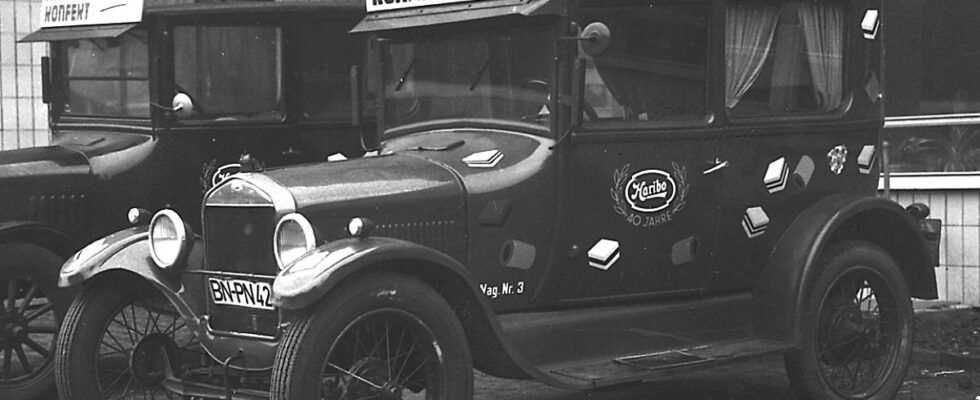Sunday 13th December 2020
Bonn confectionery empire turns 100
Shadows over the Haribo anniversary
The company, which started as a candy maker in a backyard in Bonn, has conquered almost the whole world with its fruit gums over the past 100 years. But for the anniversary there is clear criticism of the current Haribo boss – including from the gold bear advertising icon Thomas Gottschalk.
Around 160 million gold bears leave the Haribo factories around the world every day – plus countless bags full of liquorice snails and other sweets. On the occasion of the company's 100th anniversary, the family company founded on December 13, 1920 in Bonn is not only the market leader in the fruit gum and liquorice segment in Germany. According to its own statements, it has risen to become the number one confectionery brand in the USA this year – with the exception of the chocolate market. Haribo has been celebrating its 100th birthday with an elaborate advertising campaign since the beginning of the year.
However, the anniversary year of all things turned out to be not that easy for the group. Not only Corona bothered the confectionery manufacturer. In East Germany, the announcement that the Haribo plant in Wilkau-Haßlau in Saxony would be closing caused outrage. The state of Saxony then ended its advertising cooperation with the confectionery manufacturer. Federal Labor Minister Hubertus Heil intervened and asked the management to reconsider their plans.
Gottschalk criticizes dealing with employees
The clear criticism from Thomas Gottschalk, who was the advertising face of the confectionery group for 24 years, caused a stir. "If you are committed to:" Haribo makes children happy – and adults as well, "then you have to take it seriously as an employer," said Gottschalk of the "Kölner Express" tabloid.
(Photo: picture alliance / dpa / dpa-Zentralbild)
In addition, he believes, according to the confidante of the company boss Hans Riegel Junior, who died in 2013, that the long-standing company patriarch would have seen it the same way – obviously in contrast to the current company boss Guido Riegel. The management of Haribo is sticking to its decision. The closure is "economically necessary" with a view to the competitiveness and future direction of Haribo, said a company spokesman.
The dispute over a price increase demanded by Haribo also resulted in Lidl customers not finding any Haribo products on the shelves of the discounter for months. According to industry information, Edeka had also temporarily restricted its Haribo range. But this dispute seems to have been resolved in the meantime. "At Edeka the shelves are filling up again," was the last saying at Haribo.
Corona attacks the "impulse product"
Even the corona crisis did not leave the confectionery manufacturer unaffected. According to its own information, the company recorded sales growth in the food trade in the first half of the year. But at the same time, sales in other sales channels – such as airports and train stations – collapsed. In addition, it is noticeable in the current partial shutdown that consumers went shopping much less than before – and then often made bulk purchases, said a Haribo spokesman. "There is often a lack of leisure, which is not advantageous for an impulse product like ours."
The company was founded in 1920 by the skilled candy maker Hans Riegel in a backyard in Bonn. This is still reflected in the company name today: It stands for HAns RIegel BOnn. The company grew quickly. The first fruit gummy bears appeared in the range as early as 1922. In 1925, Riegel also began manufacturing liquorice products. Today the family business employs 7000 people worldwide, has production facilities in 10 countries and exports its confectionery to more than 100 countries.
In Germany alone, there are around 300 products on offer, and around 1000 worldwide. One of the secrets of success is to adjust the taste of your own products to local preferences, explains Haribo. Since 2018, the company's headquarters are no longer in Bonn, but rather in the nearby Rhineland-Palatinate municipality of Grafschaft, where Haribo moved into new company headquarters.
"We always eat"
Despite Corona, Haribo is optimistic about the future. "The US market is very important to us. We see a large market here and further growth opportunities for Haribo in the coming years and decades," said a company spokesman. The first Haribo plant in North America is currently being built in the state of Wisconsin. The family company still sees white spots in Asia. There can be no question of this in Germany: Haribo's market share in the fruit gum and liquorice business fluctuates between 56 and 60 percent.
The confectionery manufacturer does not see the current discussion about excessive sugar consumption in the population as a threat to its future. "The much discussed hidden sugar does not exist at Haribo," emphasized a company spokesman. Gold bears, liquorice snails and Co. are pleasure products and not staple foods. Consumers are also aware of this. Haribo looks to the next 100 years with confidence, as a company spokesman says: "We always nibble."
. (tagsToTranslate) Economy (t) Haribo (t) Bonn (t) Thomas Gottschalk
